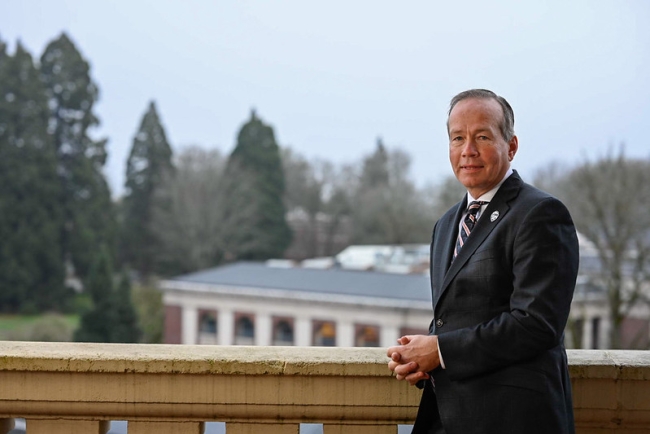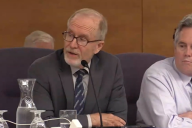You have /5 articles left.
Sign up for a free account or log in.

Oregon State president F. King Alexander will serve under a probationary period for several months after the university's Board of Trustees considered his future in light of a report critical of the way his administration handled Title IX reports at LSU.
Courtesy of Oregon State University
The Oregon State University Board of Trustees voted 12 to 2 Wednesday to place the university's president, F. King Alexander, on probation, effective immediately.
The vote concluded a fraught board meeting centered on a report released earlier this month that found Louisiana State University mishandled dozens of sexual misconduct allegations, including allegations against its former head football coach Les Miles, over a period when Alexander was LSU president. Alexander was president at LSU from 2013 through 2019.
Alexander, who became Oregon State’s president last year, will remain on probation until June 1, when the board will reconvene to once again discuss his fate at the university. In the meantime, the board will “conduct an evaluation to gather feedback to help inform President Alexander’s success and to address leadership feedback received by the community,” according to the resolution trustees passed.
The board’s executive committee will also hire an independent consultant to review the recommendations of the LSU report and follow up on outstanding questions from the board. The results of this review will be made public.
Also during the probationary period, Alexander will be required to review the recommendations of the LSU report and to identify opportunities to improve Oregon State’s policies and procedures, and to assess funding needs for Title IX and survivor services. He will also need to develop a plan to rebuild trust among university employees, students and community members.
The LSU report, completed by law firm Husch Blackwell, documents several systemic failures at LSU regarding the university’s Title IX reporting policies and procedures while Alexander was president. The report also focuses heavily on how the LSU administration and athletics department mishandled sexual misconduct allegations against Miles, who was the university's football coach until he was fired midway into the 2016 season. Miles denied the allegations in the report and left his position as head football coach at the University of Kansas last week after the LSU report was made public.
Oregon State trustees Michele Longo Eder and Khawater Hussein, who is a current student at Oregon State, voted against the motion.
“I don’t think there are significant questions that remain about the contents of the report, and I’m concerned that there’s some element of kicking a decision down the road,” Longo Eder said.
During Wednesday’s board meeting, several concerned trustees pointed to an email to Alexander from Joe Alleva, Louisiana State’s former athletics director, in which Alleva encouraged Alexander to dismiss Miles and wrote that Miles continued to text, call and be alone with student workers even after he was told not to.
“One more time I want us to think about which scenario is worse for LSU. Explaining why we let him go or explaining why we let him stay,” Alleva wrote. “I always believe that people are innocent until proven guilty and in that case I believe he is guilty of insubordination, inappropriate behavior, putting the university, athletic dept and football program at great risk.”
Alleva sent the email in June 2013, a couple of weeks before Alexander took up the presidency at Louisiana State.
Alexander told the Oregon State Board of Trustees that the Louisiana State University Board of Supervisors decided to retain Miles before he became president and that he was not involved in that decision.
“The decision to keep Les Miles with some penalties was made by the board and it was made two months prior to my arrival at LSU,” Alexander said. “And that was based on the fact that there was not enough evidence to terminate the football coach.”
Alexander repeatedly told the Oregon State Board of Trustees that he could not remove Miles for prior sexual misconduct allegations because he did not have enough evidence. The former head coach was let go in 2016 after the football team started the season 2-2, with news coverage at the time indicating that poor performance was the primary reason for Miles’s termination. Longo Eder asked Alexander exactly why Miles was fired from Louisiana State, and Alexander said it was because Miles was not a “good university citizen.”
“There were no other sexual misconduct-related issues, but there were other issues that said to us he is just not a good university citizen because he believes he is bigger than life,” Alexander said.
Trustee Julia Brim-Edwards said she and other trustees didn’t learn about the Husch Blackwell report until it was published earlier this month. She asked Alexander why he didn’t tell the Oregon State board about the ongoing investigation earlier.
Husch Blackwell began working on the report in November of 2020.
Almost all university employees and students who spoke during the board meeting’s public comment period called for Alexander’s dismissal. Several people spoke about their own sexual assault experiences and expressed concern that Alexander would not foster a safe environment for sexual assault survivors. Alexander’s public statement in response to the Husch Blackwell report and his remarks during a Monday faculty meeting were also targets of public criticism from university employees and students.
Commenters also took aim at the closed search process the board used to hire Alexander.
“This moment is fundamentally the result of a flawed hiring process. Boards of trustees are told that closed searches in which only the successful candidate is publicly identified are the preferred way, in fact, nowadays the only way to hire university leaders,” Kathleen Stanley, an instructor of sociology at Oregon State, said during the meeting. “No one, let alone a public university president, should be hired behind a veil of secrecy.”
Rani Borkar, chair of the Oregon State board, issued a statement after the meeting ended in which she acknowledged that the board has lost the trust of some in the discussions over Alexander.
"We heard today from survivors and advocates about the need for survivor-centered, trauma-informed processes and resources. We heard the importance of offering students, staff and faculty robust resources, including both reporting options and confidential support and resources. This input will guide the university’s response. As well, we heard from students, staff and faculty concerns about a lack of trust in the board. We acknowledge the need to rebuild OSU community confidence in our leadership as OSU’s governing body."
Alexander issued a video after the meeting in which he said recent weeks have been "trying for members of the OSU community."
He said, "I hear and feel your hurt and your anger." And Alexander said that some feel he "betrayed you as your university president."
He acknowledged that "there was more I could have done at LSU given the power of my office." He pledged to "listen and learn" and to "rebuild trust." Alexander said he would "prove my commitment with action" in the days ahead.








